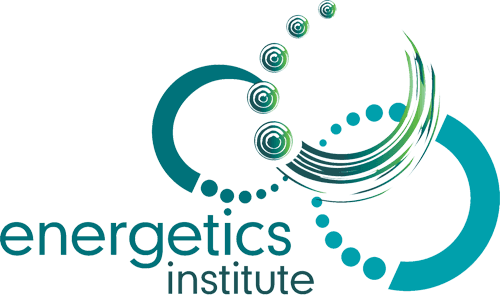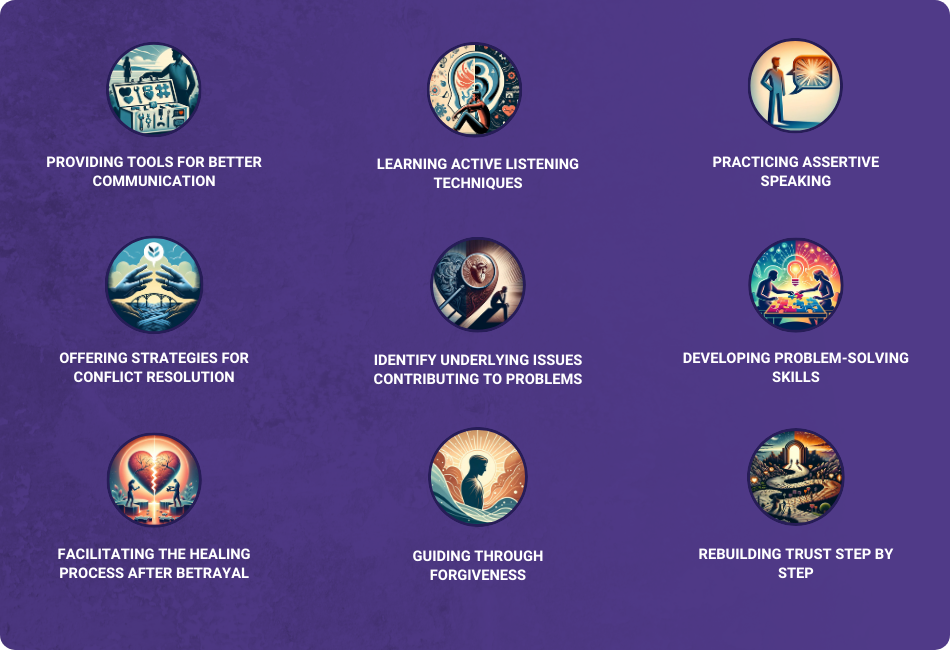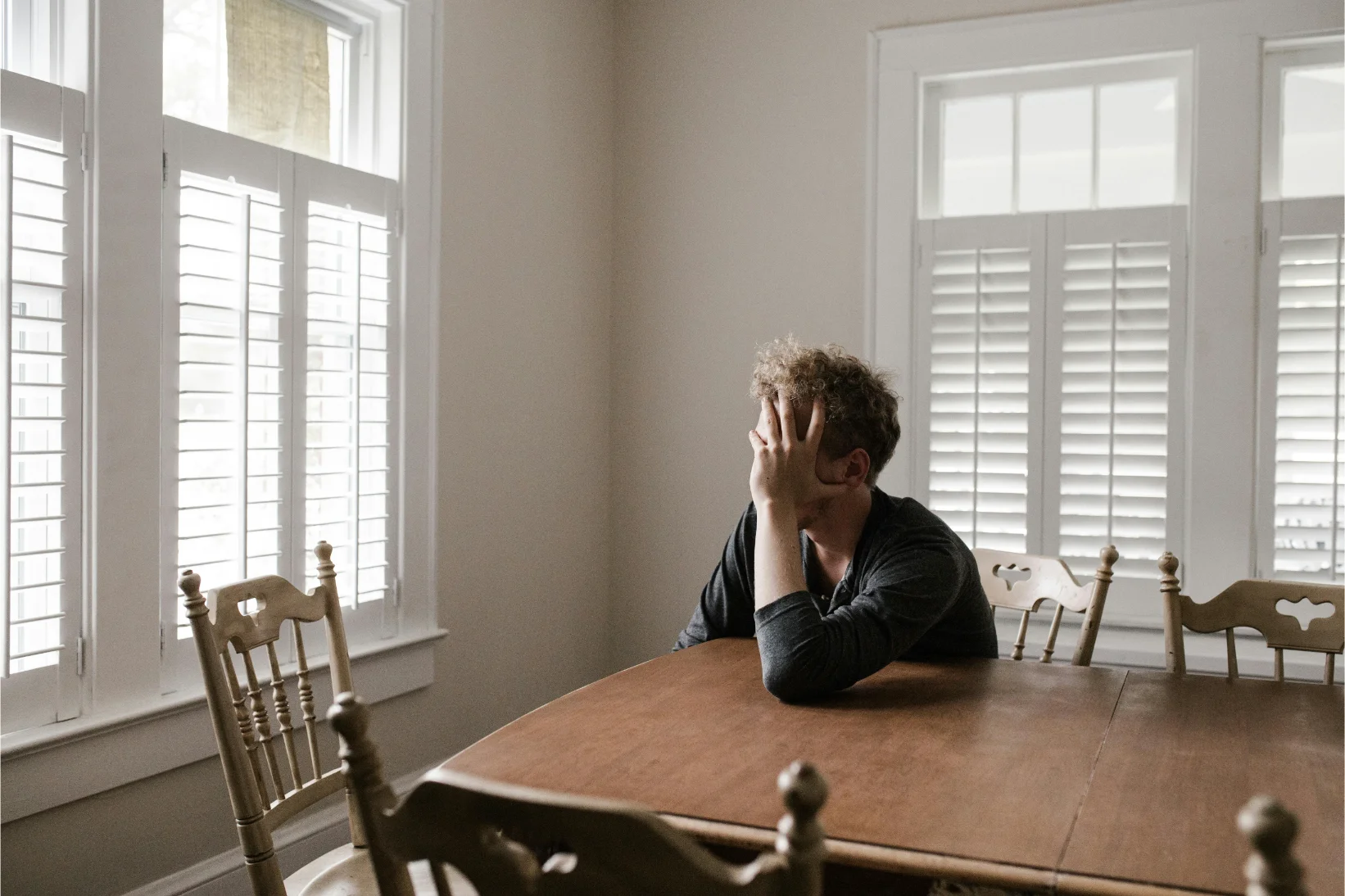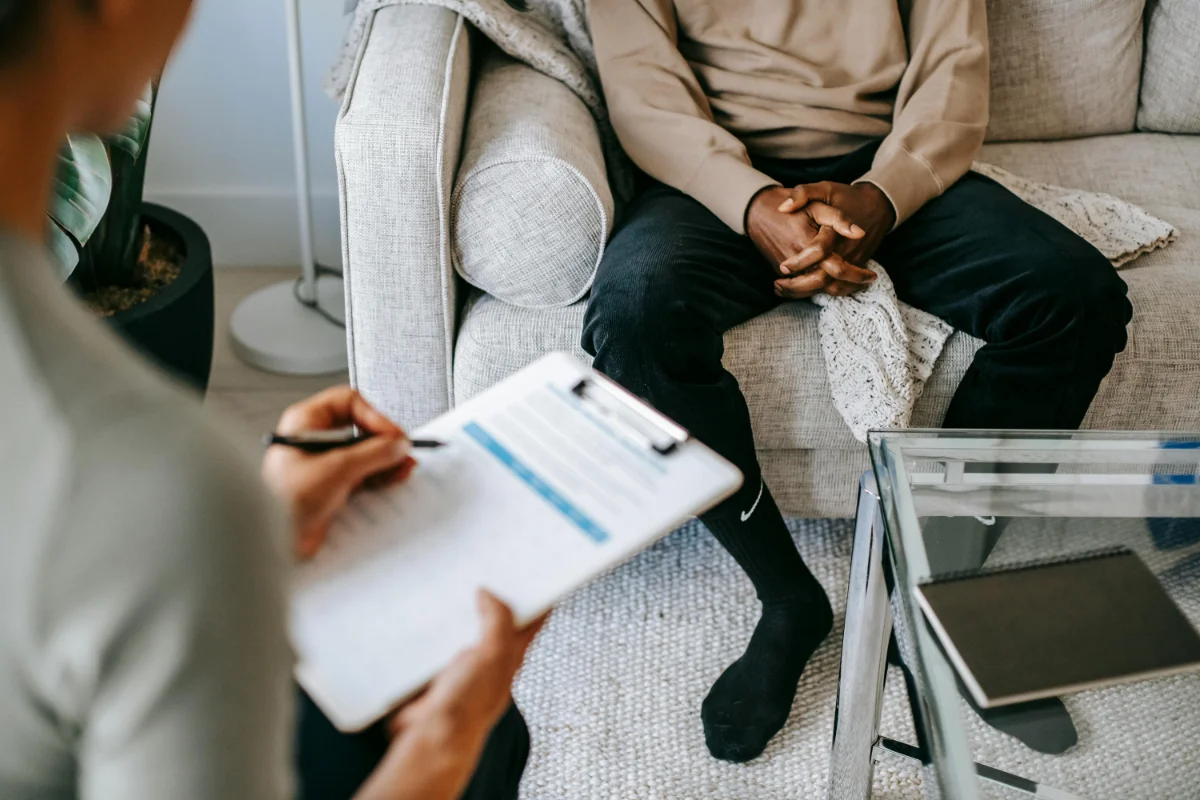If your struggling with relationship issues, please take our survey to see the severity
[gravityform id=14 title=false description=false ajax=true tabindex=100]
Marriage & Relationship Counselling For Men
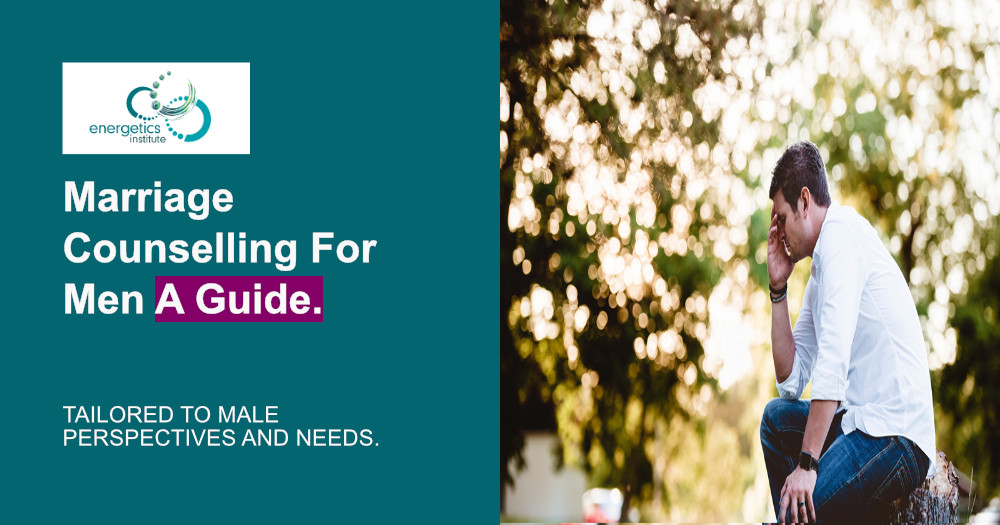
Marriage counselling for men distinguishes itself by addressing the unique emotional and psychological needs that men face in relationships. This specialised form of therapy adapts techniques like Cognitive Behavioral Therapy (CBT), Emotionally Focused Therapy (EFT), and solution-focused strategies to resonate with men’s experiences, offering paths toward understanding and improved mental health. These methods are tailored to help men navigate their relationships more effectively, whether through individual sessions targeting personal challenges or couples therapy to improve relationship dynamics.
Acknowledging the diversity within men’s experiences, this approach provides a customisable and inclusive pathway to therapy and emotional well-being. It highlights the importance of tailored counselling services that meet each individual’s specific needs, enhancing the effectiveness of counselling.
In the sections that follow, we’ll delve into how these counselling methods are specifically adapted for men, offering insights into their strategies, benefits, and the transformative potential they hold for fostering healthier, more fulfilling relationships. This exploration will not only shed light on the distinctiveness of marriage counselling for men but also on its critical role in promoting personal and relationship growth, illustrated with evidence and real-life examples.
What is marriage counselling for men?
Marriage counselling for men is a specialised form of therapy designed to address the unique challenges and emotional needs men face in their marital relationships. It focuses on providing men with new skills needed to improve communication, resolve conflicts, and build stronger, more fulfilling partnerships. Through techniques like Cognitive
Behavioural Therapy (CBT) and Emotionally Focused Therapy (EFT), men learn to express emotions constructively, understand their partner’s perspective, and work together to achieve mutual satisfaction and growth in the relationship.
This type of therapy not only aims to resolve existing issues in your current relationship but also to foster personal development and a deeper emotional wellbeing between partners.
Why men seek relationship counselling?
Men seek marriage counselling for a variety of reasons, all aimed at enhancing the quality of their relationship with their family and children. They may wish to improve communication skills, find new ways to express themselves and understand their partners. Others are looking to resolve ongoing conflicts such as family violence or anger management that have become cyclical and damaging.
Rebuilding trust after infidelity is another common reason, as men seek to repair and strengthen their relationship following betrayal. Additionally, issues such as sexual dissatisfaction and financial disagreements are also significant factors that drive men to seek counselling. Through therapy, men aim to address these issues head-on, working towards a healthier, more satisfying partnership with their spouse, family and friends.
To improve communication skills
Improving communication is fundamental in relationship counselling for men. It involves learning to express thoughts and feelings clearly and understanding a partner’s perspective to enhance mutual understanding and empathy.
To resolve ongoing conflicts
Men seek counselling to find effective ways to address and resolve recurring conflicts within their marriage. This includes learning strategies for negotiation, compromise, and finding common ground to prevent these issues from undermining the relationship.
To rebuild trust after infidelity
Rebuilding trust is a crucial aspect of counselling after incidents of infidelity to prevent separation or divorce. It focuses on healing the emotional wounds caused by betrayal and working on steps to reestablish trust and commitment in the relationship.
To address sexual dissatisfaction
Addressing issues of sexual dissatisfaction involves open discussions about desires, expectations, and concerns in a safe and supportive environment. Counselling helps couples explore solutions and reconnect on a physical and emotional level.
To manage financial disagreements
Financial disagreements are a common source of tension in marriages. Individual and couples counselling provides a platform to openly discuss financial goals, responsibilities, and fears, helping couples to develop a shared approach to managing their finances harmoniously.
How marriage counselling helps men
Counselling services support men by equipping them with effective tools and strategies to tackle the challenges within their relationships. It focuses on enhancing communication, where men learn to articulate their thoughts and feelings more clearly and listen to their partners empathetically. Active listening techniques and assertive speaking are practised to foster a healthier dialogue between partners.
Counselling also offers strategies for conflict resolution, helping men to approach disagreements constructively. By identifying underlying issues that may be contributing to marital strife, counselling enables men to understand and address the root causes. Developing problem-solving skills is another key benefit, allowing men to work collaboratively with their partners to find solutions.
For those dealing with the aftermath of infidelity, counselling facilitates the healing process and guides couples through the steps of forgiveness and rebuilding trust. Overall, marriage therapy for men is a transformative journey that not only aims to resolve current issues but also strengthens the relationship for future challenges.
Providing tools for better communication
Marriage counselling equips men with effective communication tools, enabling them to express themselves clearly and understand their partner’s needs, fostering a stronger connection.
Learning active listening techniques
Men learn active listening techniques in counselling, focusing on truly hearing and empathising with their partner, which is crucial for resolving misunderstandings and deepening emotional intimacy.
Practicing assertive speaking
Counselling encourages assertive speaking, where men are taught to convey their thoughts and feelings confidently and respectfully, promoting honesty and openness in the relationship.
Offering strategies for conflict resolution
Counsellors provide conflict resolution strategies, helping men navigate disagreements constructively, without escalating tensions, ensuring a healthier dynamic between partners.
Identifying underlying issues
Through counselling, men can identify underlying issues contributing to marital problems, allowing for targeted solutions that address the root causes rather than just the symptoms.
Developing problem-solving skills
Men develop problem-solving skills, learning to approach challenges collaboratively with their partner, fostering teamwork and mutual satisfaction in finding solutions.
Facilitating the healing process after betrayal
Counselling plays a key role in facilitating the healing process after incidents of betrayal, guiding men and their partners through the steps necessary to rebuild trust and commitment.
Guiding through forgiveness
Guidance through forgiveness is offered, helping men understand and navigate the complex emotions involved in forgiving or seeking forgiveness, which is essential for moving forward.
Rebuilding trust step by step
Counselling supports men in rebuilding trust step by step, emphasising the importance of patience, consistent efforts, and mutual understanding in restoring the foundation of the relationship.
Finding the right marriage counsellor
Finding the right marriage counsellor is a crucial step for couples seeking to heal and improve their relationship. This search entails identifying a professional whose experience and credentials align with the couple’s unique needs. Specialisation in marital therapy is key, as it suggests a deeper understanding and experience with the intricacies of a couple’s issues. The therapeutic approach is also important; whether it’s Cognitive Behavioral Therapy (CBT), Emotionally Focused Therapy (EFT), or another method, it should resonate with both partners and address their specific concerns.
Beyond their qualifications and methods, the comfort level and compatibility with the counsellor are just as critical. The initial consultation can offer valuable insights into the counsellor’s style and demeanour, helping the couple determine if there’s a good match with their expectations. Feeling understood and supported by the counsellor can significantly influence the success of therapy, highlighting the importance of the selection process in the journey towards positive change.
Prioritising health professionals with a proven track record and the necessary qualifications to handle marital issues ensures they have the expertise to guide the couple effectively. Whether the counsellor uses techniques to change negative thought patterns and behaviours or to strengthen emotional bonds, the fit between the counsellor and the couple is fundamental. The relationship should feel comfortable and supportive, facilitating open communication and engagement in the therapeutic process. This mutual comfort and trust are crucial for the therapy’s success, underscoring the importance of finding the right marriage counsellor as a key step towards a healthier and more fulfilling relationship.
Challenges men face in counselling
Men often encounter specific challenges when engaging in marriage counselling, which can influence their journey towards healing and growth within their relationships. One of the primary hurdles is the difficulty in expressing emotions openly, as societal norms have historically discouraged men from showing vulnerability. This can make it hard for them to articulate their feelings and needs within the counselling setting.
Additionally, men may struggle with learning emotional vocabulary, which is crucial for effective communication and emotional connection with their partner. Accepting responsibility for one’s part in relationship issues is another challenge, as it requires moving from a stance of blame to one of understanding and accountability. Engaging fully in the counselling process can also be daunting due to overcoming scepticism about the effectiveness of therapy and recognising the value it can bring to their personal and marital life.
These challenges, though significant, can be addressed and overcome with the right support and guidance, leading to meaningful progress in counselling.
Expressing emotions openly
Men often face the challenge of expressing emotions openly in counselling, which is crucial for authentic communication and healing within the relationship.
Overcoming societal norms
Overcoming societal norms that discourage emotional vulnerability in men is essential for them to fully engage in the therapeutic process and achieve personal growth.
Learning emotional vocabulary
Acquiring an emotional vocabulary is key for men to articulate their feelings and needs effectively, fostering a deeper connection with their partner.
Accepting responsibility
Accepting responsibility for one’s actions and their impact on the relationship is a significant step towards reconciliation and mutual understanding.
Acknowledging contributions to issues
Men are encouraged to acknowledge their contributions to relationship issues, which is vital for moving forward and making positive changes.
Moving from blame to understanding
Moving from blame to understanding requires a shift in perspective, recognising that resolving conflicts involves empathy and cooperation from both partners.
Engaging in the process
Fully engaging in the counselling process involves active participation, openness to change, and a commitment to applying learned strategies outside of sessions.
Overcoming scepticism
Overcoming scepticism about the effectiveness of counselling is a common hurdle, but recognising the potential benefits can motivate men to invest in the process.
Recognising the value of therapy
Recognising the value of therapy is crucial for men to see counselling as a worthwhile endeavour that can enhance their well-being and mental health, and the health of their relationship.
Overcoming resistance to counselling
Overcoming resistance to counselling is a critical step for men who may initially be hesitant or sceptical about the therapy process. Understanding the benefits of counselling, such as improved communication, a deeper emotional connection, and the resolution of unresolved issues, can help men see the value in seeking professional help. Recognising the impact of unresolved issues on personal happiness and the health of the relationship is also crucial.
These issues can lead to personal unhappiness and relationship deterioration if not addressed. Committing to growth and improvement involves seeing change as positive and valuing the overall health of the relationship. This commitment can transform resistance into readiness, paving the way for a more fulfilling and harmonious partnership.
Final Thoughts
In conclusion, marriage and relationship counselling for men represents a pivotal step toward fostering deeper connections, better mental health, understanding, and emotional well-being in relationships. By tailoring approaches such as Cognitive Behavioral Therapy (CBT) and Emotionally Focused Therapy (EFT) to meet the unique challenges and needs men face, this specialized counselling offers a pathway to significant personal growth and relational harmony.
Overcoming societal norms that hinder emotional expression, and addressing personal and mutual challenges within the relationship, men are guided towards improved communication, conflict resolution, and a renewed sense of partnership.
Through embracing the transformative journey of counselling, men not only work towards resolving current issues but also lay the groundwork for enduring relational success, demonstrating the profound impact and essential nature of targeted therapeutic support in achieving healthier, more fulfilling relationships.
